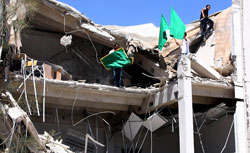 Contrary to the Obama administration's legal interpretation, recent military operations in Libya?which include repeated piloted and drone air attacks?should be treated as "hostilities" under the War Powers Resolution. This is reportedly what the Justice Department's Office of Legal Counsel advised. Yet the president rejected this view, instead siding with that of the State Department and White House counsel's office.
Contrary to the Obama administration's legal interpretation, recent military operations in Libya?which include repeated piloted and drone air attacks?should be treated as "hostilities" under the War Powers Resolution. This is reportedly what the Justice Department's Office of Legal Counsel advised. Yet the president rejected this view, instead siding with that of the State Department and White House counsel's office.
This series of events, if true, is seriously flawed. But some critics have gone overboard, especially those who draw analogies to the Bush administration's disregard for the rule of law and its flawed legal interpretations of the federal statute criminalizing torture. Some commentators even are equating State Department Legal Adviser Harold Koh with John Yoo, the former deputy at OLC in the Bush administration who is credited with OLC's most infamous legal advice. Whether from the right or left, these comparisons are dangerously misguided and threaten important lessons we could learn from both episodes.
From the right, Eric Posner provocatively describes Koh and Yoo as "two peas in a pod." To Posner, the pod is good. Both Yoo and Koh, he argues, acted properly as government lawyers to advance their presidents' policy preferences, through legal interpretations that were appropriately driven by desired results. Posner's defense of Koh's stance on Libya thus seeks to rehabilitate Yoo for his stance on torture. From the left, Bruce Ackerman?a fierce critic of Yoo's?suggests that the Obama precedent might actually be worse than the "torture memos." Ackerman argues that at least the right office?the Office of Legal Counsel in the Department of Justice?issued the flawed torture interpretations.
Yoo's infamous memos on torture and other subjects, you'll recall, made sweeping claims of presidential authority to act contrary to clear federal statutory commands, based on a radical view of the president's constitutional war powers. This view denies Congress the ultimate authority to prohibit torture, no matter how clearly defined, where the president as commander-in-chief deems it warranted. More, Yoo's legal claims?and the Bush administration's executive actions?were kept hidden from the public and ultimately were revealed only through government leaks.
That extreme and secret claim of a sweeping authority to violate statutes simply has nothing in common with the Obama administration's very public engagement on the meaning of a controversial provision of the War Powers Resolution: its requirement that, after 60 days, the president must terminate military action not specifically authorized by Congress. Since its enactment, interpretation of the "60-day clock" has been the subject of repeated public debate between the executive branch and Congress. Here, Obama is openly joining that debate, but expressly is not challenging Congress' legislative authority to establish limits on his conduct of war.
President Nixon vetoed the War Powers Resolution because he believed the 60-day clock interfered with the president's war powers. Congress disagreed and overrode his veto, and a published 1980 OLC opinion (correctly) found the 60-day clock constitutional. The Obama administration asserts that the 1980 memorandum remains in force and that it is not challenging the constitutionality of the War Powers Resolution. By contrast, in one of his memos, Yoo baldly states?without authority or any reference to the contrary 1980 OLC opinion?that neither this nor any other statute "can place any limits on the President's determinations as to any terrorist threat, the amount of military force to be used in response, or the method, timing, and nature of the response."
The outcry against the torture memos, from Republicans and Democrats alike, centered on these very broad claims of absolute executive power and right to secrecy even in disregarding statutory commands. The Obama administration has raised no such threat to the fundamental constitutional balance of powers, and indeed has disavowed the Bush approach. But what about the narrower question of statutory analysis? Is Koh's analysis really just like Yoo's?
To be clear: I disagree with the Obama/Koh interpretation. I believe the 60-day clock continued to run even after NATO took control, with the U.S. government engaging in numerous piloted as well as drone bombings in Libya. But the quality of Koh's analysis is clearly superior to Yoo's, which several law professors have opined would not receive a passing grade in their class. In any event, any mistakes here are an aberration from the Obama administration's pattern of adherence to and restoration of the rule of law.
Like Slate on Facebook. Follow us on Twitter.
Dawn Johnsen is a professor of law at Indiana University's Maurer School of Law. She led the Office of Legal Counsel during the Clinton administration and was President Obama's first nominee to head OLC, but withdrew in April 2010 after 15 months without a Senate vote.Photo by Mahmud Turkia/AFP/Getty Images.
Source: http://feeds.slate.com/click.phdo?i=ccb832cfd633deeb322e4ce1261a1a1d
No comments:
Post a Comment
Note: Only a member of this blog may post a comment.